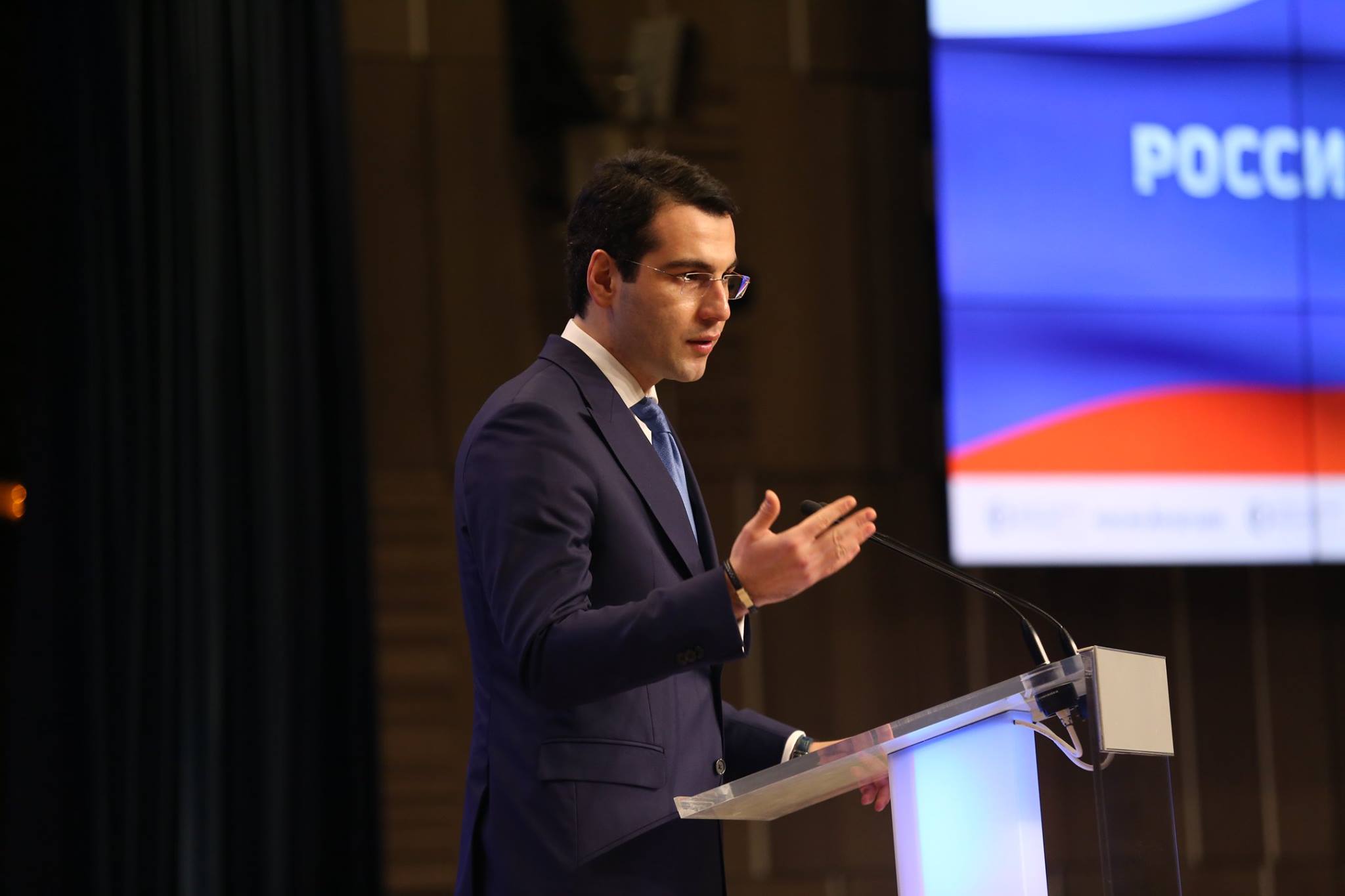On November 17, Abkhaz leader Aslan Bzhania replaced long-serving top diplomat Daur Kove (42) with 31-year-old Inal Ardzinba, a former Kremlin official. The long-rumored move, has gone largely unnoticed in Tbilisi, where the controversy surrounding the hunger strike of jailed ex-President Mikheil Saakashvili stole the show. But the change signals a turning point.
Kove built his career mostly in Abkhazia, while Ardzinba, who is a scion of a family with distinguished pro-independence credentials (Vladislav Ardzinba, the leader who took on Tbilisi in war, was his relative, while his father also fought in 1992-1993 conflict) made most walks of his life in Moscow.
Graduate of the prestigious High School of Economy in Moscow in 2012, he has served under infamous Kremlin mastermind Vladislav Surkov, overseeing Ukraine file. Featuring prominently in so called “Surkov leaks” Ardzinba was accused in 2015 by Kyiv of attempts to undermine its territorial integrity.
Civil.ge approached seasoned watchers of peace and conflict in Georgia to discuss the reasoning behind Bzhania’s decision, prospects for Ardzinba to establish himself in Abkhaz politics, and possible implications of his appointment for relations between Tbilisi and Sokhumi.
Context: Reasons Behind Appointment?
Olesya Vartanyan from the International Crisis Group says there can be various reasons behind Bzhania’s decision, with the Abkhaz leadership’s interest in raising more funds in Russia being the major one. Despite many visits to Moscow, Bzhania has hard time mobilizing finances, and may be hoping that the erstwhile Kremlin hand could facilitate things, Vartanyan argues.
She says if Ardzinba truly has Moscow’s back and manages to bring hard-needed cash, his stock will raise in Sukhumi politics, but “if this is not to happen, some will turn to another side of this story – about Mr. Ardzinba not really being an insider, with some background stories that rather signal his disadvantages with the current fund raising mission.”
Giorgi Kanashvili notes that Bzhania’s move may have been prompted by his political fragility, not least because of recent calls for the resignation of “the interior minister,” as well as continued energy crisis and unabating COVID pandemic.
Kanashvili says getting Ardzinba on his team gives Bzhania much needed backing of the influential Ardzinba grouping, as well as the historical and political veneer of that family. That is especially relevant since another member of that group, Adgur Ardzinba, Bzhania’s key rival in 2020 leadership race is emerging as the united opposition leader.
A Stranger in Abkhaz Politics?
Kanashvili says “foreign ministerial” position offers Inal Ardzinba a convenient platform to test his political skills and to integrate closer into Abkhaz politics. But, the expert says, attitudes towards Ardzinba – who is often seen as too “refined” for Abkhazia’s adventurous politics — is far from being univocal in the region.
His ambition and his way of seeing things that transpires in media interviews – which is considered to be more Russian than Abkhaz – may irritate some in Abkhazia. Yet, Ardzinba is a colorful personality, and he may yet become a strong politician in Abkhazia, Kanashvili notes.
Nino Kalandarishvili of the Institute for the Study of Nationalism and Conflicts, Tbilisi-based CSO focusing on studying Abkhazia and Tskhinvali/South Ossetia conflicts, says Inal Ardzinba may lack versatility, but is eagerly ambitious.
She thinks Ardzinba’s lack of experience of Abkhazia’s internal politics may not be a key disadvantage, but the powerful Russian influence backing him may cut both ways. Kalandarishvili argues, people may question whether Inal Ardzinba, who spent most of his adult life in Russia, is sufficiently committed to the Abkhaz cause, especially when it comes in conflict with closer integration with Moscow.
Vartanyan believes Ardzinba “can well become a local if he truly wants it.” As he “comes from an important family and this can be a good start in his reintegration with the Abkhaz society,” but, the pundit continues, if this is truly what Ardzinba wants, he would have to lead the life that is very different to what he has been accustomed to in Moscow.
“Would he really want to put aside his ambitions and his past life to enter troubled, very personalised and often heavy politics of Abkhazia?! It remains to be seen,” Vartanyan notes.
Drifting Away from Tbilisi?
Ardzinba will be the youngest official to deal with the occupied region’s foreign affairs to date. This position puts him in in charge with relations with Tbilisi, including through participation at the Geneva International Discussions.
Peace and conflict watchers in Tbilisi also think Ardzinba’s entry to Abkhaz politics marks the generational change. With younger, Russia-educated people coming to the top, the personal linkages – even if they were tinted negatively – with the rest of Georgia fade, deepening estrangement between Sokhumi and Tbilisi. Inal Gablia, who became “education minister” last year, is only 30, while Anri Bartsits, who has justice portfolio, is 31.
Kalandarishvili says unlike his parents’ and grandparents’ generations, Ardzinba experienced no neighborly relations with Georgians – neither positive or negative — in what was once a multi-national social fabric in Abkhazia. But from stories he could hear, and political situation, he would have hold anti-Georgian views, Kalandarishvili thinks, and no interest in bridging the gap.
Kanashvili agrees: “our societies are oriented in different directions. We are more friendly with the West, we go there, we have friends there, and that’s where our new memories are. For the Abkhaz, this [trend] is the opposite, [towards Russia].” “Things could be opened up, not necessarily via Tbilisi, so we may find connections in the West,” he argues.
“This is a serious issue and we have to think about it,” Kanashvili concludes.
